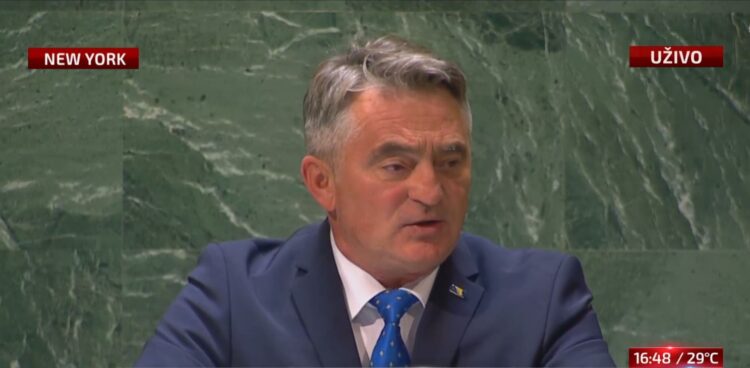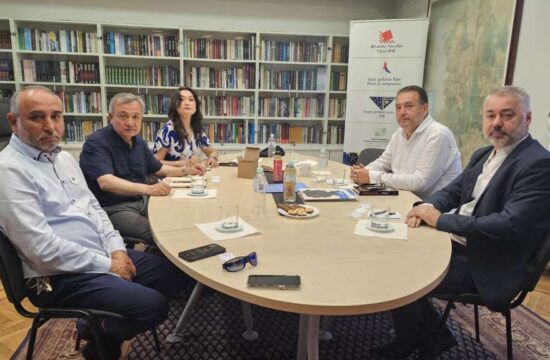
Bosnia's tripartite Presidency Chairman Zeljko Komsic addressed the General Debate of the 78th session of the United Nations General Assembly, pointing out that Bosnia and Herzegovina has given support to the 2023 Agenda, especially its goals, that, to the greatest extent, concern the creation of the world and the environment in the United Nations member countries, in a way that we as states and their societies are prepared and specially trained to implement all the steps that will lead us to self-sustainable development.
”However, in today's world, often dominated by war and various geopolitical goals, it will be very difficult to achieve this, at least in the way as it was planned in the 2030 Agenda. For this reason, I specifically wish to emphasize that the first step with which we must start our activities is the one that will lead us to permanent peace, as the world's number one priority and then to other mutually related activities in order to have our countries and societies ready for solidarity and progress,” he said.
He took this opportunity to recall that migrations are one of the elements of Agenda 2030, trying to be dealt with systematically and with specific governance. Although the Agenda for Sustainable Development until 2030 recognizes migrants as “agents of change and development.”
The current form of migration management has reached such a stage where large and powerful countries, for their own benefit, carry out a certain type of selection of migrants, in such a way as to select the best and most educated among them, such as doctors, engineers, scientists and other highly qualified persons, and are ushering them to larger countries where their knowledge and abilities are exploited, exclusively for the benefit of these larger systems. In larger countries and larger systems, such selected migrants can be “agents of change” or bearers of various improvements, but, at the same time, the potentials and capacities of the smaller countries from which the migrants are coming, are weakened.
He stressed that it is difficult to talk about building trust while larger countries and their large systems are taking over the population of smaller countries through migration, and, simultaneously, the smaller countries are emptying out, resulting in the creation of an environment in which poverty develops and completely prevents any form of development in the economic and social sense.
Thus, a direct attack is made on the possibility of creating prerequisites for self-sustainable development in smaller countries.
Komsic pointed out that there is a significant outflow of the population in BiH, going to larger and more developed countries, mostly to countries we view as Western democratic countries.
“While investigating why our people, Bosnians and Herzegovians, decide to leave their country and look for better living conditions in some other countries, we came to the conclusion that the fundamental reason for their departure is their conviction of the lack of perspective in Bosnia and Herzegovina.
In such a system, you usually don't have the best people in key positions, people who, with their knowledge and abilities, can build a political, economic and social system in BiH. On the contrary, you have ethnically and politically suitable staff who can hardly be expected to lead the overall progress of the country.
The current political system in Bosnia and Herzegovina, based exclusively on ethnicity and then on political affiliation, completely degrades democracy as an important principle for creating an environment with equal opportunities for all people.
Our current political system is skillfully used by our western and eastern neighbours, and through ethnic communities in Bosnia and Herzegovina, to which they claim ethnic rights, they are running BiH, not with the primary aim of helping the members of these ethnic communities, but with the aim of dividing Bosnia and Herzegovina or making it meaningless as a state,” Komsic said.
He mentioned Bosnia's two neighbors, Croatia and Serbia for whom he said “they strive to claim every right through the ethnic communities in Bosnia, even twenty-seven years after the aggression they had carried out over Bosnia and Herzegovina, and are in this manner, making an attack on the sovereignty of our country, which makes it almost completely impossible to have any democratic development of BiH,” said BiH Presidency Chairman.
“That is why we believe that it is in the interest of the United Nations if peace is to be preserved in the Western Balkans, to support the state of Bosnia and Herzegovina and its institutions.
If the United Nations wishes to preserve peace in the Western Balkans, then it should support those who have not violated democratic and civilizational norms, who have not committed genocide, were not part of joint criminal enterprises, did not destroy people's lives because of their ethnicity, did not destroy other people's temples and shrines, did not advocate revanchism and revenge.
If such support is absent, then the responsibility and blame for destabilization does not lie with us, who will certainly not calmly and idly observe some new attempt to destroy our Bosnia and Herzegovina.
However, the fundamental problem of Bosnia and Herzegovina lies in the inequality of citizens in the political and electoral system, the result of which is an ethnic system governing the country, a system that is destined to be conflictual. In addition, the ethnic system of exercising power in BIH continuously creates space for nepotism and corruption in all segments of society, especially in government institutions.
The latest interventions of the international representatives in Bosnia and Herzegovina, i.e. the intervention of the High Representative, by means of legal violence and the suspension of the Entity Constitution for twenty-four hours, which is an inconceivable precedent in the democratic world, did not remove obstacles to the normal functioning of the state, but rather strengthened the undemocratic ethnic principle and deepened the discrimination of citizens in the Constitution and the Electoral Law.
In short, this means that we in Bosnia and Herzegovina will have to change the entire paradigm within society and shift from ethnic political representation to civic political representation, which is the standard in a democratic world.
‘We must use this opportunity to draw the attention of the United Nations, to something that is, in my opinion, and I am sorry to say this, a very uncivilized stand of the Government and the Prime Minister of our neighbouring country who have rejected a Judgement of the European Court of Human Rights, the latest judgment in the Kovacevic case, and have stood up for the very principles that were rejected in mentioned judgment, like the political principle of legitimate representation based on ethnicity, which is a generator of inequality among the citizens of BiH, and a means by which the neighbours undermine the state of Bosnia and Herzegovina. This was done in such a way that it can be qualified as an interference in the internal affairs of Bosnia and Herzegovina,” said Komsic.
He added that BiH will be able to participate in projects, such as Agenda 2030, in full capacity and more efficiently, as an equal participant and actor in all planned activities, only when civic political representation is accepted in the country through the implementation of the judgments of the European Court and when parallel to that, the attacks on the sovereignty of the state of BiH from the neighbourhood are stopped.
”I would like to emphasize that Bosnia and Herzegovina will actively work on the implementation of Agenda 2030. We will work on building trust and solidarity. By rejecting the discriminatory ethnic concept, we will simultaneously reject the system dominated by nepotism and corruption, and thus bring our society into the ranks of democratic and mature societies,” concluded the Chairman of the BiH Presidency Zeljko Komsic in his address at the General Debate of the 78th session of the United Nations General Assembly.




Kakvo je tvoje mišljenje o ovome?
Budi prvi koji će ostaviti komentar!